Top 10 Rarest Fishing Lures that Made a Splash 2024: Despite the fact that collectible fishing lures may not attract the same large crowds as rare action figures or dolls in immaculate condition, there are still a great number of aficionados who are interested in the history and design of these things.
The lure has undergone a number of design and material modifications over the course of its history, each of which is evidence of the inventiveness and artistic ability of humans.
Because there are so many lures, several of them are regarded to be extremely uncommon and precious. Check out the following to learn more about this specialized world of collectibles.
Top 10 Rarest Fishing Lures That Made a Splash 2024
1. Spoonplug
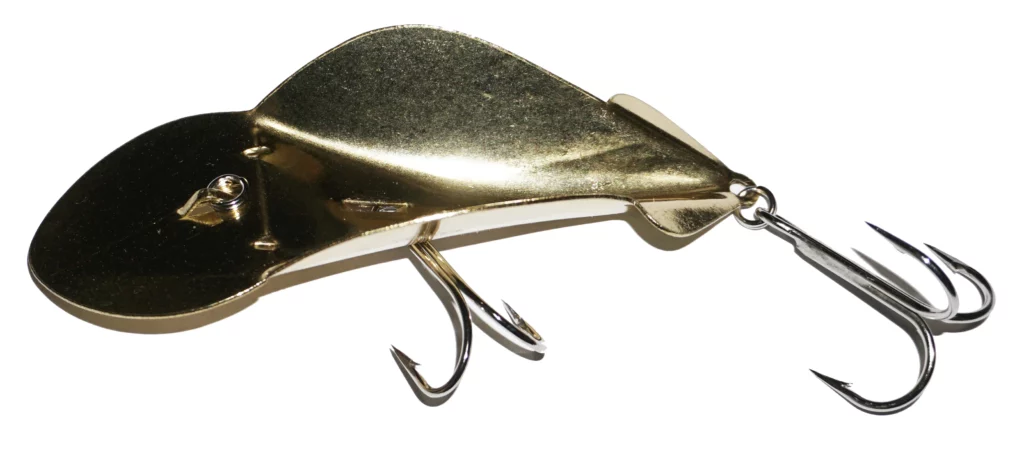
- Company: Buck’s Baits
- Year: 1928
- Worth: $25
Buck Perry came up with the idea for the spoonplug as he was getting increasingly upset at his inability to capture fish in a nearby lake due to the fact that the fish typically stayed submerged for long periods of time.
His innovation maintained a consistent depth for the lure, which resulted in a greater number of fish being captured. In addition, the metallic body of the lure reflected light, which attracted fish.
Perry used a pair of pliers he had at home to construct the very first spoonplug, and he later started selling them in a variety of colors. The development of the spoonplug ushered in a new era in the operation of fishing lures, which in turn revolutionized the sport of modern sportfishing.
Have you any idea?
The spoonplug is a hybrid lure that combines elements of two different types of lures. The spoon lure works by reflecting light, which draws in fish; on the other hand, plug lures can be used in both deep and shallow water when fishing in rivers.
2. Paw Paw Bullhead
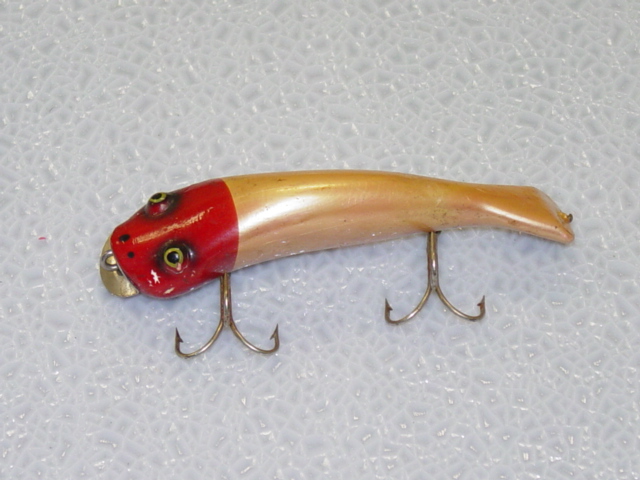
- Company: Paw Paw Bait Company
- Year: 1915
- Worth: about $40
The production of the Paw Paw Bullhead began in 1929 but was stopped in the 1930s, which has contributed to the instrument’s relatively high level of rarity today.
It was constructed out of wood and finished in a number of colors, depending on the price. In addition to that, it included two metal hooks that each had three points.
Did you know that the Paw Paw Bait Company recently acquired the Moonlight Bait Company? The Moonlight Bait Company was established in 1908 by Horace Ball and Charles Varney.
3. No Eyes Bass Oreno Lures
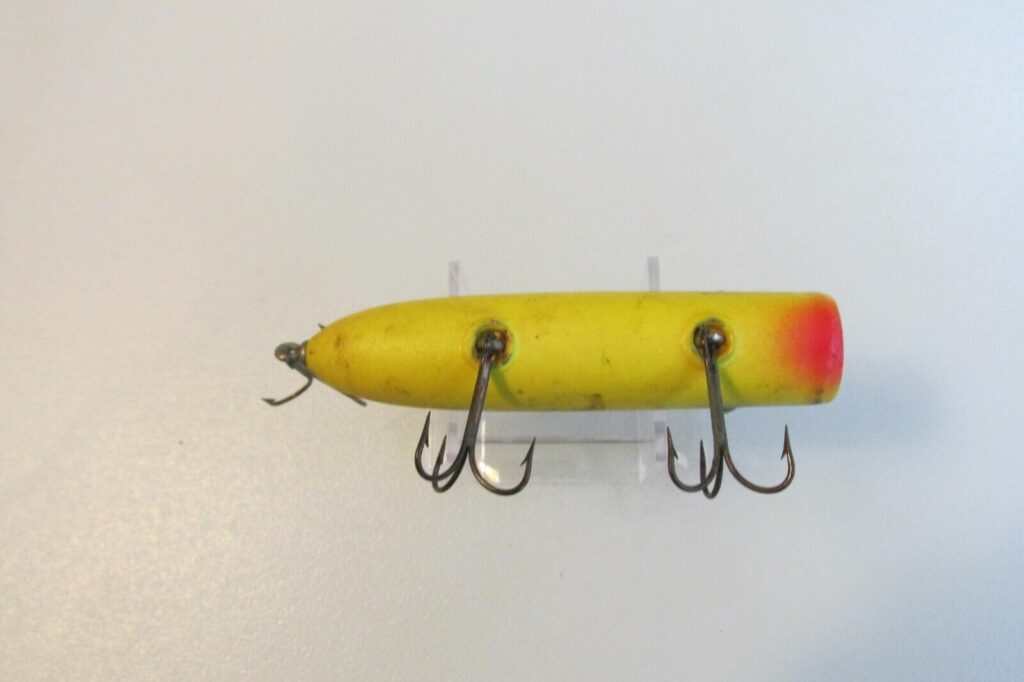
- Company: Bass Oreno
- Year: 1929
- Worth: $90 – $160
Because Bass Oreno lures have been around for such a long time, it stands to reason that they have undergone a number of evolutions. 1915 saw the production of the first versions, which lacked intricacy for the most part.
They were made of wood and painted red and white. Notably, neither painted nor glass eyeballs of any kind were included in their design in any capacity.
They did, however, have screw eye hook hangers, which were more difficult to remove from the screws than the hook hangers that were used afterward.
Have you any idea?
Over 49 million people in the United States went fishing in 2017, marking the first record high for fishing participation since 2007.
4. Yellow Magnum Torpedo Lure
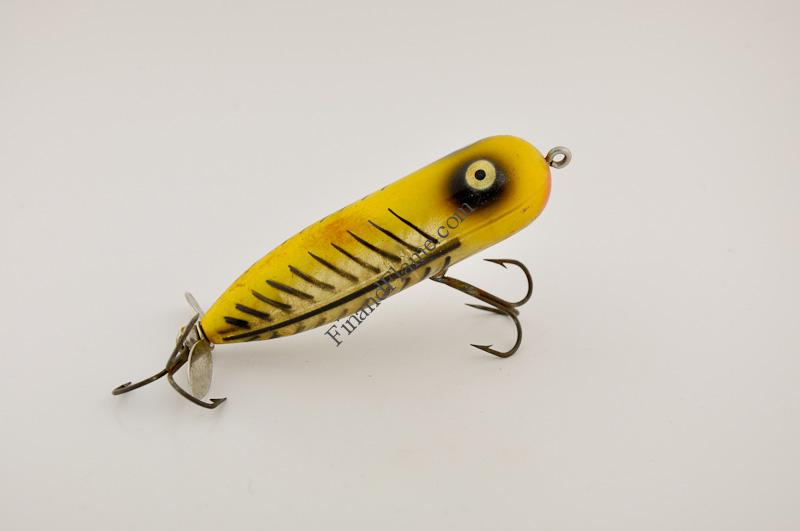
- Company: Heddon
- Year: 1969
- Worth: $4,009.99
The Magnum Torpedo lure has been designed to resemble a torpedo, as its name suggests, and it has a spinner tail that helps it sink deeper into the water. In addition to that, it included two hooks with three points located on either end.
Plastic, not wood, was the material of choice for the construction of this particular vintage lure, in contrast to the majority of the others on this list.
It was available in a variety of colors, but the yellow model with the black bone is the most difficult to find.
Have you any idea?
You can know when a Magnum Torpedo was manufactured based on its eye color and general shape.
5. Clyde C. Hoage Spoon-Fin Minnow
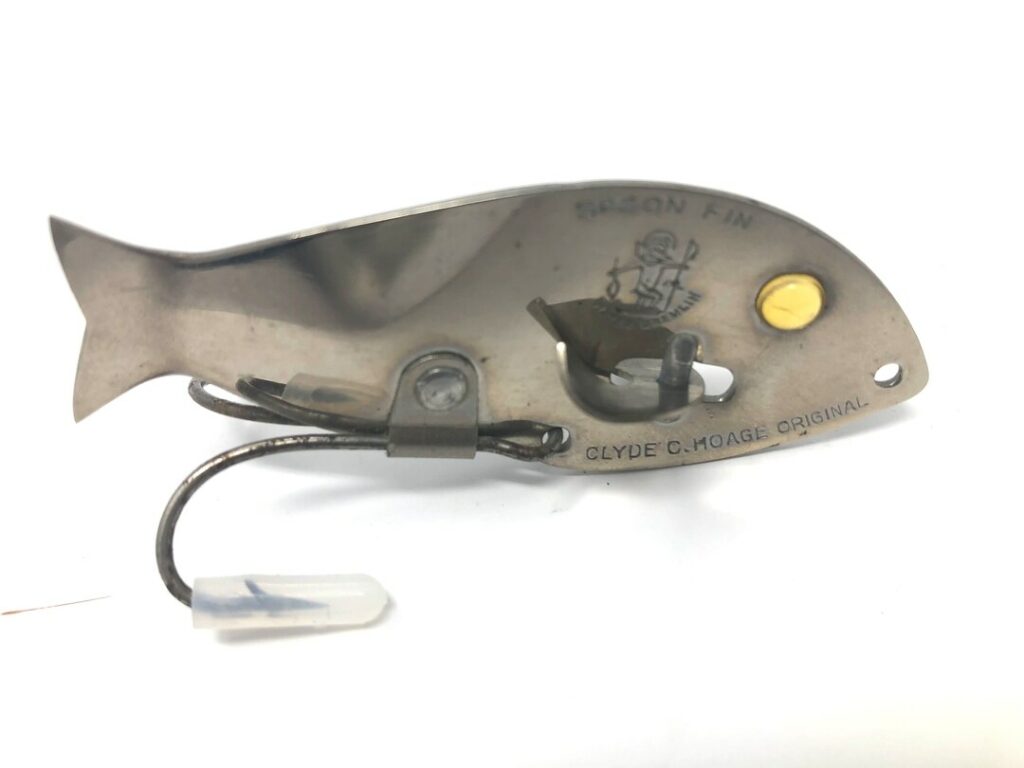
- Company: Clyde C. Hoage
- Year: 1930s
- Worth: Unknown
Today, it can be challenging to track down the Spoon-fin minnow fishing lure that was designed by Clyde C. Hoage. It is constructed out of wood, and it has glass eyeballs that, in some instances, have been painted crimson.
In addition, it contained metal fins that were stamped with the company name and two metal hooks that each had three points of articulation. It was most likely crafted sometime during the 1930s.
Did you know that fishing lures have been around for centuries? The earliest known lures were made of bone and bronze, and there is evidence that they were used in ancient Egypt and China.
6. Live Action Frog Lure

- Company: Action Frog Corporation
- Year: 1960
- Worth: $150
In the 1960s, the Action Frog Corporation, which was situated in Long Beach, California, developed this complex fishing lure.
It was the only lure that the company ever developed and the only colour that it came in was green plastic. In the front, there was a spinning propeller that made its legs kick like those of a real frog.
Additionally, there were two metal hooks that each had three prongs. Even more uncommon is finding it still in the vibrant box it came in.
Have you any idea?
The practice of fly fishing, which employs artificial flies rather than traditional lures to catch fish, was first documented in the thirteenth century.
7. Layfield Paddle Lures
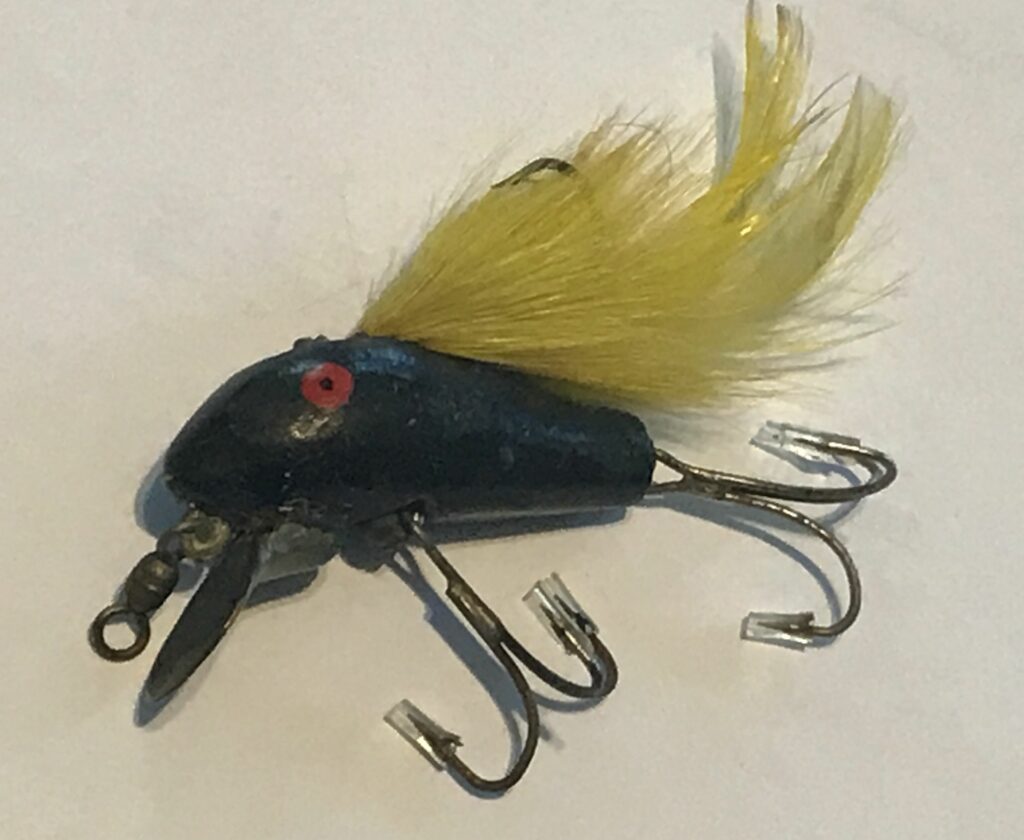
- Company: Vintage Texas
- Year: 1930s
- Worth: Unknown
The body of the Layfield paddle lure was made of wood, and it had two metal paddles—one on each side—to assist with its movement.
The tuft of skunk hair that was featured on its end, which helped it float and also gave it the moniker “Cotton’s topwater,” was however its greatest claim to fame and the reason it became so famous.
It was available in a few different hues, including one that was a blend of yellow and black, but the passage of time has caused some versions to become rather weathered.
Have you any idea?
Since 2002, China has been the top worldwide fish exporter with an industry worth $14.1 billion.
8. Wiggly Crab

- Company: Medley’s
- Year: 1919
- Worth: Unknown
In 1919, Henry Medley submitted a patent application for the Wiggly Crab fishing lure, which represented a novel approach to trolling and deep-sea fishing.
The Wiggly Crab, much like the spoonplug that came after it, was intended to be used below the surface of the water and to imitate the appearance of a living fish by having a tail in the shape of a V that was able to move.
The lure is equipped with two hooks, both of which are suspended from the body of the lure. It is extremely difficult to locate the lure anywhere online in the modern era, which contributes to its rarity.
Have you any idea?
Because of the negative effects that modern plastic lures have on the environment, a number of companies have begun manufacturing lures composed of biodegradable materials.
9. Neon Firefly
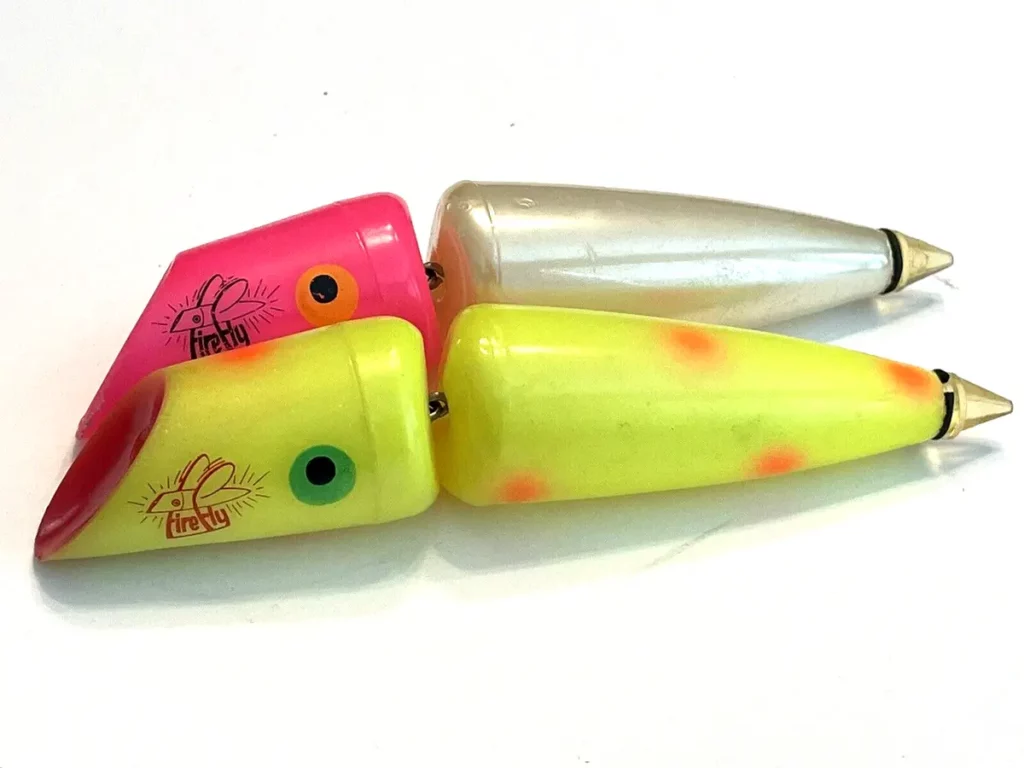
- Company: Saint Croix Bait Company
- Year: c. 1920 – 1930
- Worth: $200
In the world of lures, the Neon Firefly is one of the most mysterious. Experts don’t know much about its history, but its packaging shows that it’s from the Saint Croix Bait company and was presumably created between 1920 and 1930.
Some industry professionals believe that it was the very first instance of a plastic lure ever manufactured.
It made use of both red and clear plastic, with the latter containing liquid mercury to create a glowing effect that attracted fish to the area.
It’s possible that the materials were a contributing factor in the low production numbers of Neon Fireflies.
Have you any idea?
As a result of the frequency with which they were discarded, fishing lure boxes frequently have a higher value than the fishing lures themselves.
10. Haskell Minnow Lure
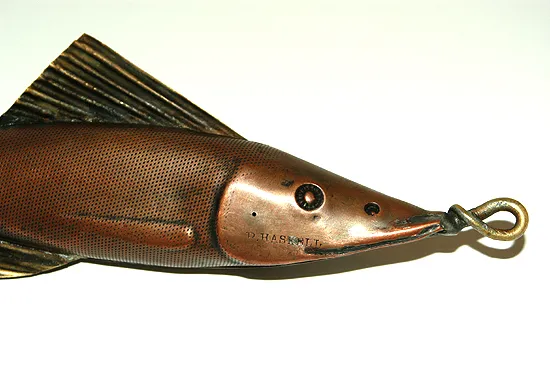
- Company: Invented by Riley Haskell
- Year: 1894
- Worth: $100,000
Due to the fact that it is one of a kind, the Haskell Minnow lure has a value of over one hundred thousand dollars, making it the most valuable and unique fishing lure in existence.
It came about when expert hunter Riley Haskell opted to pursue fishing instead of hunting and began handcrafting a variety of lures with a variety of functions.
As a direct consequence of this, the majority of his compositions took the form of singular works of art. They were all in the shape of fish and had hollow bodies, and very few of them have survived to the present day.
The minnow that’s worth $100,000 is exceptionally rare, and it measures a whopping 10 inches long. Both of these characteristics make it unique.
Have you any idea?
The greatest-ever catch of a great white shark weighed 2,664 pounds and was a specimen of the species. The International Game Fish Association confirmed that it is the largest fish they have ever measured.
Top 10 Rarest Fishing Lures that Made a Splash 2024- Newshub360.net
Related Post
Credit: www.Newshub360.net
